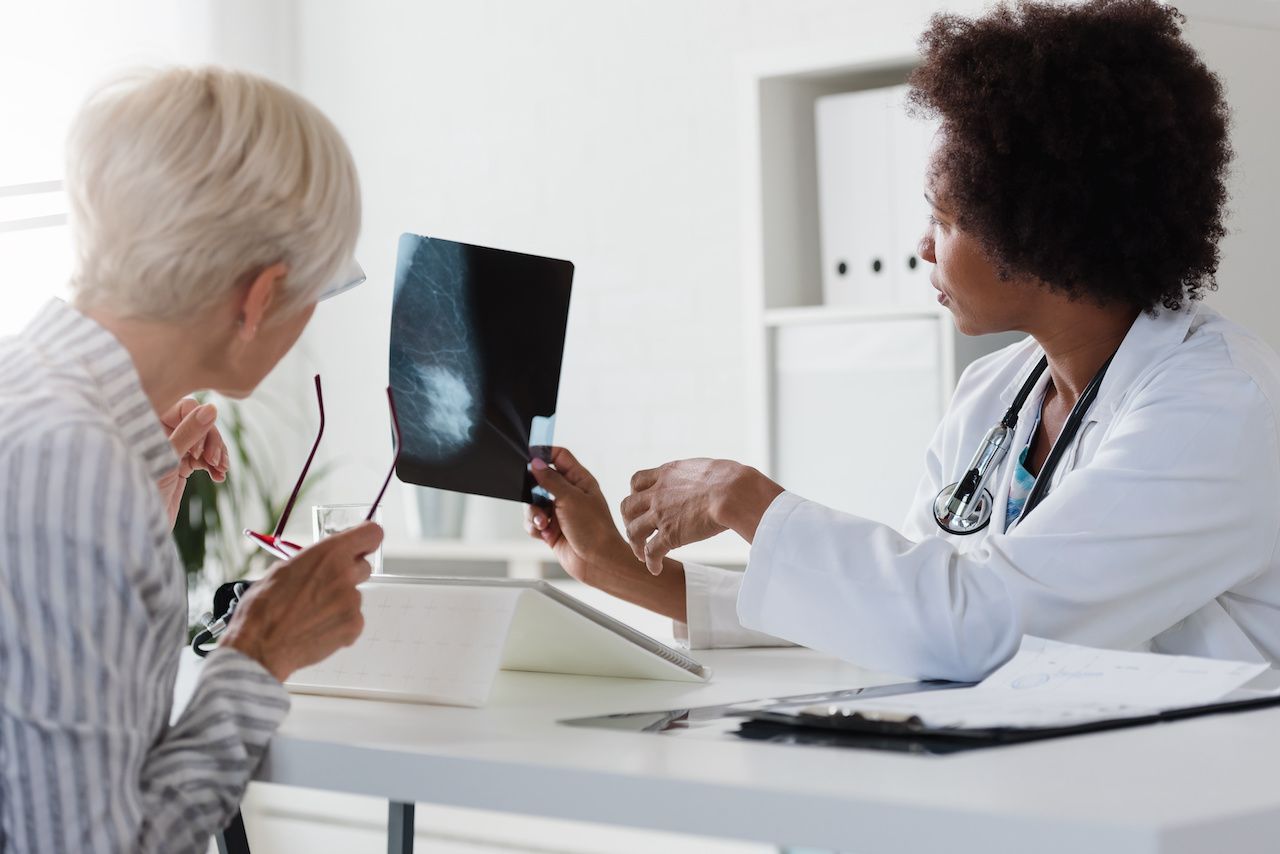- Center on Health Equity & Access
- Clinical
- Health Care Cost
- Health Care Delivery
- Insurance
- Policy
- Technology
- Value-Based Care
Older Women Have High Rate of Breast Cancer Overdiagnosis
Data from fee-for-service Medicare claims that were linked to the Surveillance, Epidemiology, and End Results program were used for this retrospective cohort analysis among women 70 years and older.
A high rate of overdiagnosis of breast cancer was seen in a retrospective cohort analysis that examined recent cancer screening results among women 70 years and older,1 indicating the potential harm to women of frequent false positive results that could lead to unnecessary invasive procedures for a cancer not likely to be symptomatic in their lifetime.2
A female doctor sits at her desk and talks to a female patient while looking at her mammogram | Image Credit: lordn

“No randomized trials have evaluated screening mammography in women 75 years and older, and only a few studies have included women over the age of 70 years, leaving uncertainty about benefits and harms of screening in older women,” the study authors wrote in Annals of Internal Medicine. “In recent years, there has also been greater recognition that overdiagnosis constitutes an important harm from breast cancer screening.”
They used data from fee-for-service Medicare claims linked to the Surveillance, Epidemiology, and End Results program and compared outcomes between women who underwent an initial breast cancer screening in 2002 (N = 54,635; mean age, 77.2 years; 6%, Black; 3%, Hispanic; 88%, White) followed by a subsequent screen in the following 3 years and those who did not have another screening in that period. Results were stratified by 3 age groups: 70 to 74 years (n = 19,925), 75 to 84 years (n = 29,320), and 85 years and older (n = 5390). The primary outcome was breast cancer diagnosis.
Among those aged 70 to 74 years, most patients in the screened (93%) and unscreened (86%) groups had a life expectancy of more than 10 years. For those aged 75 to 84 years, a life expectancy of over 10 years was most common in the screened group, while most in the unscreened cohort were expected to live an additional 6 to 10 years. Among those 85 years and older, 6 to 10 years was the most common life expectancy (58%) in the screened group and 5 or fewer years (53%) in the unscreened group.
Increasing age had a negative correlation with screening status at study cohort entry and in the first 3 years of follow-up, as well as length of follow-up:
- 70 to 74 years:
- 88% screened within 3 years of their 2002 mammogram
- 30% screened in first 3 years of follow-up
- Median (IQR) follow-up: 13.7 (9.2-14.4) years
- 75 to 84 years:
- 81% screened within 3 years of their 2002 mammogram
- 16% screened in first 3 years of follow-up
- Median follow-up: 10 (5.8-13.9) years
- 85 years and older:
- 63% screened within 3 years of their 2002 mammogram
- 6% screened in first 3 years of follow-up
- Median follow-up: 5.7 (3.1-9.1) years
More patients in each age group who were screened survived through the end of follow-up compared with those who were not screened. Among the women aged 70 to 74 years, survival rates were 62% vs 44%, respectively; aged 75 to 84 years, 35% vs 20%; and 85 years and older, 9% vs 4%.
Per 100 women, breast cancer incidence came in at 6.1 (95% CI, 5.7-6.4) cases among the 70-to-74-years screened group vs 4.2 (95% CI, 3.5-5.0) cases in the not-screened group; 4.9 (95% CI, 4.6-5.2) and 2.6 (95% CI, 2.2-3.0) cases, respectively, in those aged 75 to 84 years; and 2.8 (95% CI. 2.3-3.4) and 1.3 (95% CI, 0.9-1.9) cases among those 85 years and older. The study investigators estimated that 31% of the cases in the women aged 70 to 74 years, 47% in the women aged 75 to 84 years, and 54% in the women 85 years and older may have been overdiagnosed.
When looking at life expectancy, 63% of cases among women with 5 or fewer years were likely overdiagnosed, the authors noted, compared with 53% of cases in those aged 75 to 84 years and 32% of cases in those ages 70 to 74 years.
A final analysis conducted across the age groups, when the study investigators analyzed outcomes by breast cancer stage—in situ, localized invasive, and regional/distant—the screened groups in each age range had higher cumulative incidences of in situ and localized invasive cancers vs those note screened:
- Aged 70 to 74 years:
- In situ: 1.09 (95% CI, 0.94-1.27) vs 0.59 (95% CI, 0.36-0.98)
- Localized invasive: 3.84 (95% CI, 3.58-4.11) vs 2.56 (95% CI, 2.05-3.20)
- Aged 75 to 84 years:
- In situ: 0.79 (95% CI, 0.68-0.93) vs 0.15 (95% CI, 0.07-0.29)
- Localized invasive: 3.15 (95% CI, 2.95-3.38) vs 1.50 (95% CI, 1.21-1.86)
- 85 years and older:
- In situ: 0.19 (95% CI, 0.11-0.34) vs 0.05 (95% CI, 0.01-0.21)
- Localized invasive: 1.66 (95% CI, 1.26-2.20) vs 0.71 (95% CI, 0.39-1.29)
“We found that the proportion of breast cancer that may be overdiagnosed among older women who are screened is considerable, and increases with advancing age and with decreasing life expectancy,” the study authors concluded. “Our findings are generally consistent with estimates from other studies.”
Due to the ongoing uncertainty that continues to surround older women of the benefits and harms of breast cancer screening, the authors recommend incorporating patient feedback on risk tolerance, comfort with uncertainty, and willingness to undergo treatment when debating screening decisions.
References
1. Richman IB, Long JB, Soulos PR, Wang SY, Gross CP. Estimating breast cancer overdiagnosis after screening mammography among older women in the United States. Ann Intern Med. 2023;176(9):1172-1180. doi:10.7326/M23-0133
2. Breast cancer overdiagnosis common among older women. News release. EurekAlert! August 7, 2023. Accessed September 26, 2023. https://www.eurekalert.org/news-releases/997408?
